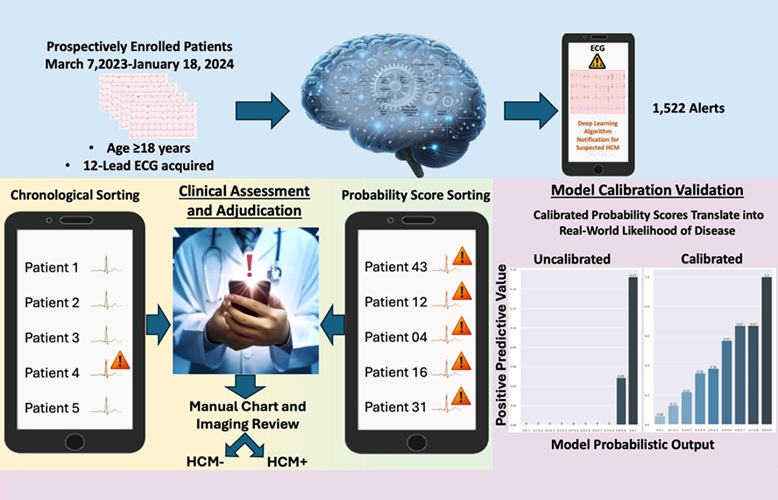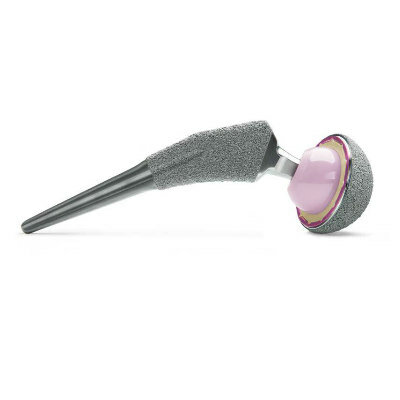Artificial Intelligence Broadens Diagnostic Abilities of Conventional Coronary Angiography
|
By HospiMedica International staff writers Posted on 08 May 2024 |
.jpg)
Coronary angiography is an essential diagnostic tool used globally to identify coronary artery disease (CAD), with millions of procedures conducted annually. Traditionally, data from coronary angiograms are restricted to detecting blockages in coronary arteries. However, advancements in artificial intelligence (AI) technology are now enhancing the diagnostic capabilities of coronary angiography, extending its utility beyond simple blockage detection to include more complex functional and hemodynamic data, which can significantly enhance clinical decision-making and improve patient outcomes. Now, a new study has demonstrated that machine learning can extract comprehensive functional and hemodynamic data from routine angiograms.
The AI-ENCODE study conducted at the Mayo Clinic (Rochester, MN, USA) has provided new insights into how AI could automate the extraction of vital functional and physiological data from routine angiograms. This study utilized sophisticated machine-learning techniques to broaden the data range extracted from routine coronary angiograms. Researchers used a database of over 20,000 angiograms from the Mayo Clinic, spanning from 2016 to 2021, to develop and validate AI algorithms capable of extracting information on left and right ventricular function, intracardiac filling pressures, and cardiac index from just one or two angiographic videos. Echocardiograms conducted around the time of the angiograms served as the comparison 'gold standard.'
The AI models were able to predict left ventricular ejection fraction (LVEF), LV filling pressures, right ventricular dysfunction, and cardiac index with areas under the receiver operating curve (AUC) of 0.87, 0.87, 0.80, and 0.82, respectively. These findings indicate that the newly developed AI models successfully extracted vital diagnostic data that typically would require additional tests, such as echocardiograms or right heart catheterization.
“Traditional diagnostic tools in cardiovascular medicine harbor vast information, but much remains underutilized. The AI-ENCODE project proved that AI can be leveraged to unlock and deliver a broader, more meaningful spectrum of clinical findings from existing angiograms,” said Mohamad Alkhouli, MD, Division Chair of Research and Innovation at Mayo Clinic School of Medicine, and lead author of the study. “This study truly shows us AI’s prowess in revealing insights beyond what the human eye can see. It is important that we leverage AI’s capabilities as a diagnostic tool to provide the best possible for our patients.”
Related Links:
Mayo Clinic
Latest Surgical Techniques News
- DNA Origami Improves Imaging of Dense Pancreatic Tissue for Cancer Detection and Treatment
- Pioneering Sutureless Coronary Bypass Technology to Eliminate Open-Chest Procedures
- Intravascular Imaging for Guiding Stent Implantation Ensures Safer Stenting Procedures
- World's First AI Surgical Guidance Platform Allows Surgeons to Measure Success in Real-Time
- AI-Generated Synthetic Scarred Hearts Aid Atrial Fibrillation Treatment
- New Class of Bioadhesives to Connect Human Tissues to Long-Term Medical Implants
- New Transcatheter Valve Found Safe and Effective for Treating Aortic Regurgitation
- Minimally Invasive Valve Repair Reduces Hospitalizations in Severe Tricuspid Regurgitation Patients
- Tiny Robotic Tools Powered by Magnetic Fields to Enable Minimally Invasive Brain Surgery
- Magnetic Tweezers Make Robotic Surgery Safer and More Precise
- AI-Powered Surgical Planning Tool Improves Pre-Op Planning
- Novel Sensing System Restores Missing Sense of Touch in Minimally Invasive Surgery
- Headset-Based AR Navigation System Improves EVD Placement
- Higher Electrode Density Improves Epilepsy Surgery by Pinpointing Where Seizures Begin
- Open-Source Tool Optimizes Placement of Visual Brain Implants
- Easy-To-Apply Gel Could Prevent Formation of Post-Surgical Abdominal Adhesions
Channels
Critical Care
view channel
Smart Bandage Monitors Chronic Wounds in Human Patients
A future smart bandage, envisioned as a "lab on skin," could assist both patients and caregivers by not only monitoring chronic wounds but also delivering treatment and accelerating the healing process... Read more
AI Identifies Patients with Increased Lung Cancer Risk Up To 4 Months Earlier
Earlier diagnosis plays a crucial role in improving the prognosis of cancer, as delays in starting therapy are associated with decreased survival rates. In most cases, cancer is first identified when symptoms... Read more
AI Algorithm Identifies High-Risk Heart Patients
Hypertrophic cardiomyopathy (HCM) is a complex condition characterized by the thickening of the heart muscle, which impairs the heart's ability to pump blood effectively. This forces the heart to work... Read more
Next Gen Hemodynamic Monitoring Solution Provides AI-Driven Clinical Decision Support
A new cutting-edge hemodynamic monitoring platform, equipped with predictive artificial intelligence (AI)-based algorithms, is designed to help clinicians proactively manage blood pressure fluctuations... Read morePatient Care
view channel
Portable Biosensor Platform to Reduce Hospital-Acquired Infections
Approximately 4 million patients in the European Union acquire healthcare-associated infections (HAIs) or nosocomial infections each year, with around 37,000 deaths directly resulting from these infections,... Read moreFirst-Of-Its-Kind Portable Germicidal Light Technology Disinfects High-Touch Clinical Surfaces in Seconds
Reducing healthcare-acquired infections (HAIs) remains a pressing issue within global healthcare systems. In the United States alone, 1.7 million patients contract HAIs annually, leading to approximately... Read more
Surgical Capacity Optimization Solution Helps Hospitals Boost OR Utilization
An innovative solution has the capability to transform surgical capacity utilization by targeting the root cause of surgical block time inefficiencies. Fujitsu Limited’s (Tokyo, Japan) Surgical Capacity... Read more
Game-Changing Innovation in Surgical Instrument Sterilization Significantly Improves OR Throughput
A groundbreaking innovation enables hospitals to significantly improve instrument processing time and throughput in operating rooms (ORs) and sterile processing departments. Turbett Surgical, Inc.... Read moreHealth IT
view channel
Printable Molecule-Selective Nanoparticles Enable Mass Production of Wearable Biosensors
The future of medicine is likely to focus on the personalization of healthcare—understanding exactly what an individual requires and delivering the appropriate combination of nutrients, metabolites, and... Read more
Smartwatches Could Detect Congestive Heart Failure
Diagnosing congestive heart failure (CHF) typically requires expensive and time-consuming imaging techniques like echocardiography, also known as cardiac ultrasound. Previously, detecting CHF by analyzing... Read moreBusiness
view channel
Expanded Collaboration to Transform OR Technology Through AI and Automation
The expansion of an existing collaboration between three leading companies aims to develop artificial intelligence (AI)-driven solutions for smart operating rooms with sophisticated monitoring and automation.... Read more















